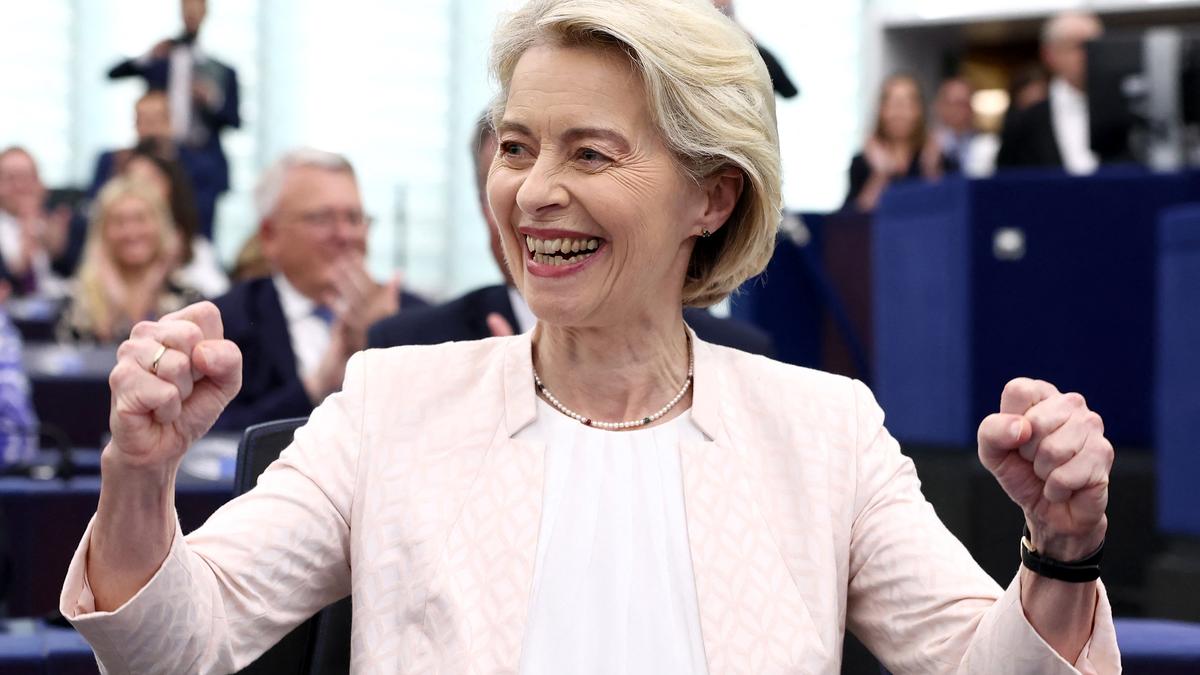
On election of the European Commission president | Explained
The Hindu
European Commission re-elects Ursula von der Leyen as President amidst political tensions and challenges ahead. Here is an explainer on how the EC president is chosen.
The story so far: On July 18, the newly constituted European Commission (EC), the executive arm of the European Union, elected Ursula von der Leyen, the EC’s first female President, for a second term. Ms. Von der Leyen, of the centre-right European People’s Party (EPP), won by a clear majority of 40 votes unlike the razor-thin nine vote margin she secured in 2019.
The selection of the EC President entails a two-stage process in consonance with the results of the parliamentary polls. The candidate is initially proposed and elected by the European Council — comprising the leaders of the EU’s 27 member countries — and subsequently put to a secret ballot in parliament. Conventionally, the Council’s choice has been a straightforward affair, determined essentially by the steady dominance of top three of the bloc’s eight political groups, namely the EPP, the centre-left Socialists & Democrats (S&D) and the liberal Renew group.
Yet the decision regarding Ms. Von der Leyen’s candidature was not unanimous. Brothers of Italy, the party of Giorgia Meloni, Italy’s far right Prime Minister, had bagged the maximum number of seats in the EU parliamentary polls. The European Conservatives and Reformists (ECR), the far-right caucus Ms. Meloni heads, had for a short time managed to muster the numbers to be counted the third largest group in the legislature. Italy, moreover, is one of the EU’s six founder members and the bloc’s third largest economy. Given this formidable background, the Italian far-right caucus was straining every nerve to exert Rome’s clout on the EU stage. While EU leaders and heads of the three main groups finalised Ms. Von der Leyen’s candidature, Ms. Meloni took strong exception to her exclusion from the meeting. In the end, Ms. Meloni and the hard-right Hungarian Prime Minister Viktor Orban disapproved the decision, leaving it to the remaining 25 leaders to back the Council’s nominee.
The ripples from Ms. Meloni’s abstention in the Council were felt across the board, giving momentary pause for Ms. Von der Leyen’s prospects for automatic reinstatement by the legislature. There were even murmurs of the Council calling for a possible second vote in case parliament rejected her appointment.
Eventually, Ms. Von der Leyen secured 401 votes, exactly the number of seats held by the parliament’s three main political groups supporting her, and well over the halfway mark in the 720-strong house. It fell to the 53 MEPs s from the Green party to come to Ms. Von der Leyen’s final rescue, backing for the first time a commission nominee. The revival of the landmark Green Deal to achieve net zero emissions by 2050, in return for the party’s critical support, remains to be seen. Ms. Meloni and the ECR are for now a much reduced force. A more potent threat facing EU centrists is the newly launched Eurosceptic and anti-immigrant Patriots for Europe group, which has overtaken the ECR and is now the third largest bloc in parliament.
The bloc’s most powerful institution, the EC, speaks as a single voice on external affairs and proposes legislation covering areas that require collective action, sifting through competing claims arising from divergent national and ideological perspectives. The most complex exercise of them all is the formulation of the bloc’s seven-year budget. Crucially, Ms. Von der Leyen has pledged to tie national disbursements from the EU budget to the observance of the rule of law and plans to impose conditions relating to the respect for fundamental rights for availing other funds. With far-right parties heading national governments or in coalition, democratic backsliding could be a matter of some concern in the coming years.
Ms. Von der Leyen’s second term would be anything but smooth sailing, as she seeks to appease and accommodate particular political constituencies.













